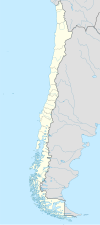Frutillar | |
|---|---|
 Top:Frutillar Lutheran Temple, Frutillar Bajo Dock, (left to right) Middle:View of Llanquihue Lake and Osorno Volcano, Francismo Tolo Monument in Bernando Avenue, Frutillar Reloj Monument, Frutillar Baja German Colonial Museum, Frutillar Baja Lke Theater (Teatro del Lago) (left to lower right) Bottom:View of Lake Llanquihue and Osorno Volcano, from Frutillar Bajo, A heritage house in Frutillar German Colonial Museum (left to right) | |
| Coordinates (city): 41°07′22″S 73°03′29″W / 41.12278°S 73.05806°W | |
| Country | Chile |
| Region | Los Lagos |
| Province | Llanquihue |
| Founded as | 23 November 1856 |
| Founded as | Villa de Frutillar |
| Founded by | Bernardo Phillipi |
| Government | |
| • Type | Municipality |
| • Alcalde | Claus Lindemann |
| Area | |
| • Total | 831.4 km2 (321.0 sq mi) |
| Elevation | 62 m (203 ft) |
| Population (2018 Census)[2] | |
| • Total | 19,400 |
| • Density | 23/km2 (60/sq mi) |
| • Urban | 9,118 |
| • Rural | 6,407 |
| Demonym | Frutillarino |
| Sex | |
| • Men | 8,948 |
| • Women | 8,577 |
| Time zone | UTC−4 (CLT) |
| • Summer (DST) | UTC−3 (CLST) |
| Area code | 56 + 65 |
| Website | www |
Frutillar is a city and commune located in southern Chile, Chilean Patagonia, in Llanquihue Province, within the Los Lagos Region, the lake district. The bay of Frutillar is placed on the banks of Lake Llanquihue, the largest lake entirely within Chile. Frutillar is known as the "City of Music", and since 2017 is part of the UNESCO Creative Cities Network (UCCN), becoming the first Chilean city to be nominated, as well as the southernmost Creative City of Music in the world.



